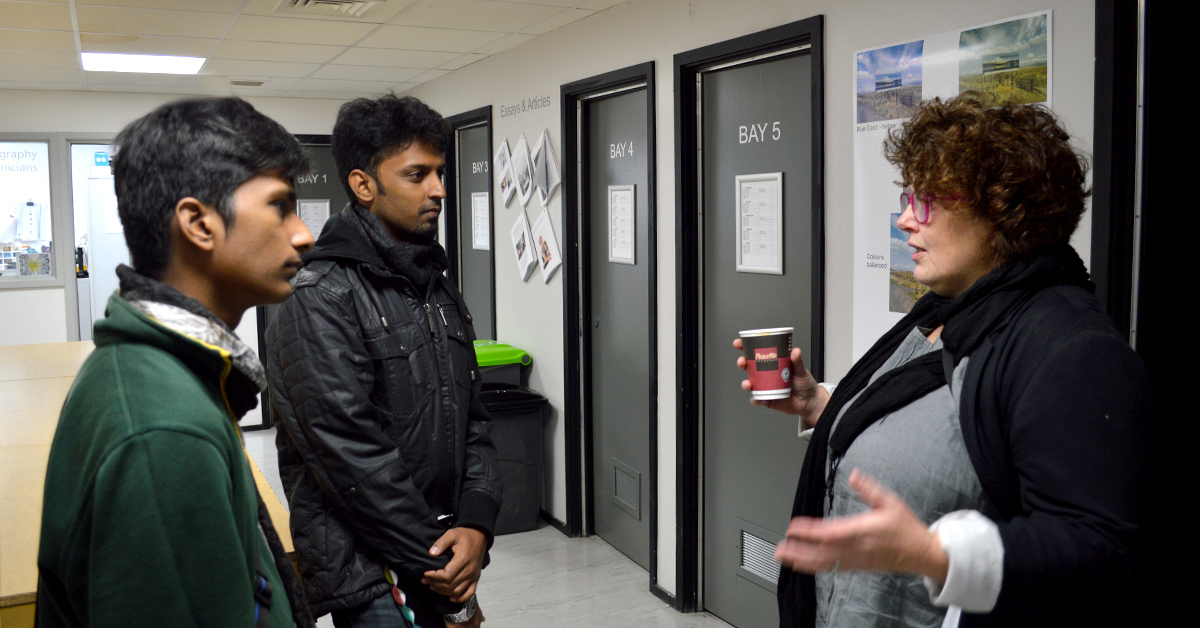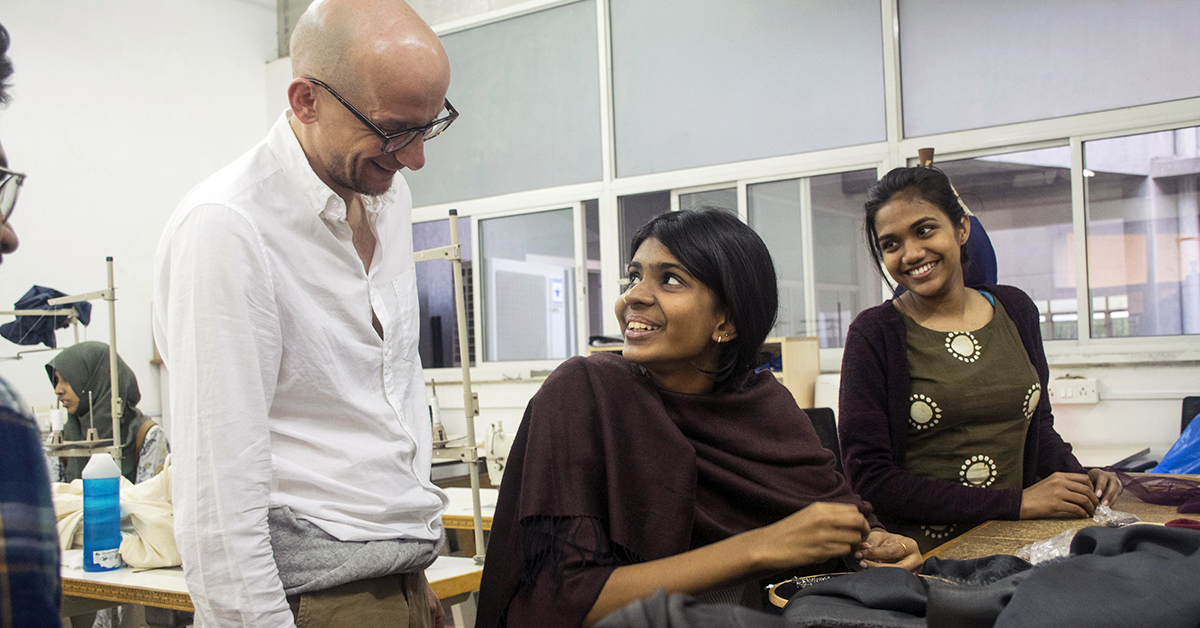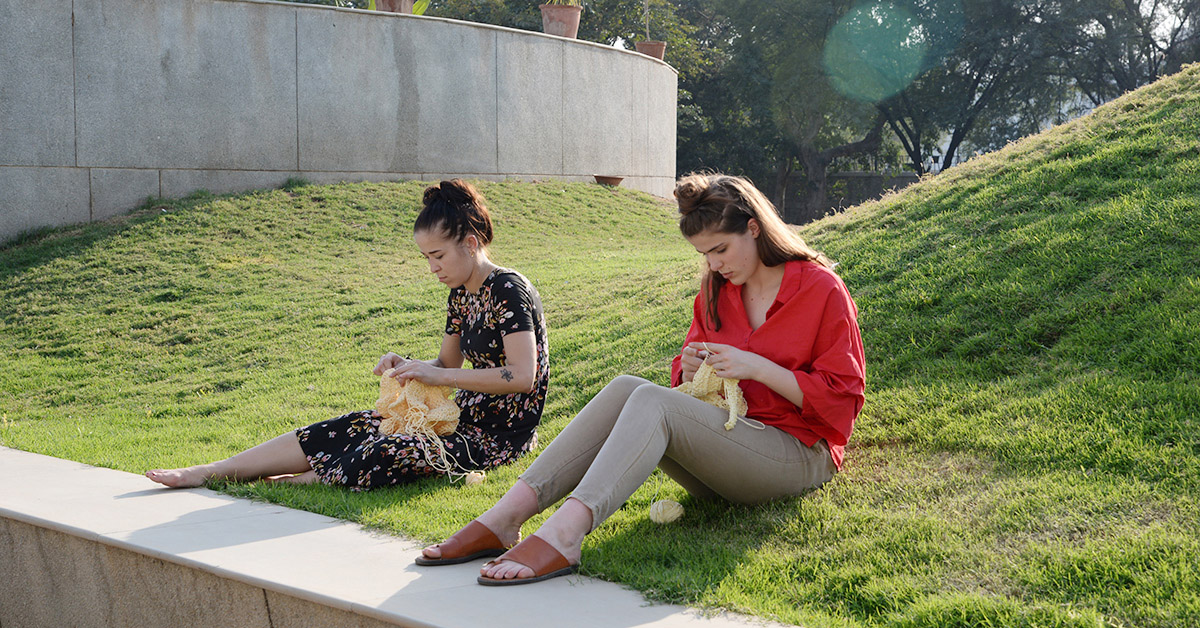National Institute of Design (NID), which has been listed by Business Week, USA as one of the top 25 European & Asian design programmes during two consecutive years (2006, 2007) again during 2009 as the top most institution in the world and in 2014 in the Top 30 design colleges of the world published by Ranker, is privileged to have the benefit of rewarding academic exchange relationship with several leading design institutions / universities across the world.
Many faculty and student exchanges along with research and academic interactions have been taking place with most of our partner institutions over the years. NID shares and values the emerging concerns and creative responses of faculty experts and students from each of these important institutions.
Faculty Exchange
NID completes its Golden Jubilee (1961-2011), there is increased focus on faculty level. One of the key areas which the International agreements would like to concentrate is exchange of faculty members between the partner institutes. The objective is to nurture and to strengthen an ongoing dialogue for design education and Research centric approach to growth & development. NID is keen to see many such exchanges taking place under the ambit of the MoU for different durations during mutually convenient time.
Research
Research is interwoven into the academic and professional design practices and methods of the National Institute of Design (NID). Creative and systematic investigation, system thinking, and developing sensitive and imaginative framework of design dissemination to the sectors that are in need of the same—all continue to remain hallmarks of NID’s approach to design research. Research initiatives are streamlined through classroom assignments, student diploma projects, faculty initiated research projects, consultancy assignments, and industry sponsored research. NID has established four Design Research Chairs and two Research Fellowships in different areas of design and design education. Applied form of design research extends further to the setting up of a number of industry sponsored research labs/centres at the institute. Research and documentation is integral to the design curriculum at NID.
NID seeks to explore possibilities of joint collaborative research projects with the partner institute. Several such international projects have yielded meaningful collaborations. The outcome of such joint collaborative research could culminate in seminars, workshops, conferences, joint publications, etc.
Publications
Publications at the National Institute of Design (NID) aims to capture the institute’s unique design philosophy and experiences gained through the practices in design education, research, consultancy and outreach. NID publications focus upon contemporary issues; social concerns; historical development; economic, political and environmental contexts; global connections; and extrapolate the philosophical developments in design. The department's range of publications includes books, monographs, catalogues, a newsletter and a magazine, which collate design activities, events, concepts, and theories. They capture the ‘hands-on’ experiences of several successful attempts that the institute has made to revive the range of design solutions exploring new conceptual knowledge and advancements in technology.
D/signed, an annual design magazine that showcases not just NID works but also encompasses the work of other design institutes in India and abroad. Contributors include artists, architects, social scientists, anthropologists design professionals and design academicians.
The Trellis, a design research journal that features research projects of both NID faculty & students, also conference papers, description of NID archival documents, book reviews, interviews, etc.
Contributions for the Trellis by way of research papers and for D/Signed by way of articles, photo essays, etc. are welcome.
Joint Workshops Collaborative Projects
The Industry Programmes and Projects (IP&P) at NID integrates design knowledge with the varied segments of industry, commerce and service sectors. IP&P conducts short duration programmes / Workshops to create awareness and sensitize the participants (Professional, Organization and Institutions) to the role of design and its contribution in translating innovative ideas/ concepts/ technology into market success by using the holistic approaches of design process as a strategic tool. Such short term workshop could be jointly offered by faculty members from both the institutes. This model can be replicated at the partner institute as well.
International Open Elective
Each year during the month of January, NID organises International Open Electives on its campus which are two week workshops offered to the senior students from across the diverse disciplines from both UG / PG programmes offered at NID. The scope and nature of the elective subjects, though pre-decided each year, are envisaged to be multi-disciplinary and trans-disciplinary thus enabling new contexts and crossovers. Mutually agreed framework, content and methodology of each workshop is announced to the NID students in advance who make their discerning choices. Visiting professors from both MoU and other institutes, for this event are invited to offer a workshop and they are also encouraged to bring along 5 - 10 of design students from their respective institute / university to participate in these workshops along with NID students.
Student Exchange
Regular student exchange between the students can take place every year for one semester. However it is advisable for the visiting student to participate in the second semester at NID (beginning from mid-November) till April.
Important
Students/faculty of NID and from partner institutes looking to explore exchange opportunities in the host institution may send their requests only through the International Offices at the Home Institutes who can process these requests based on the respective guidelines.
Read MoreList of International Collaborations
- Shenkar College of Engg. & Design, Ramat Gan, Israel
- University of Moratuwa, Moratuwa, Sri Lanka
- Kookmin University, Seoul, Korea
- Holon Institute of Technology, Holon, Israel
- Taiwan Design Center, Taipei, Taiwan
- Tama Art University, Tokyo, Japan
- Hadassah Academic College, Jerusalem, Israel
- College of Planning & Design, National Cheng Kung University, Taiwan
- Asia University, Taichung, Taiwan
- Musashino Art University, Tokyo, Japan
- Pathshala, South Asian Media Institute, Dhaka, Bangladesh
- Central Academy of Fine Arts, Beijing, China
- Kyoto Institute of Technology, Kyoto, Japan
- School of Design, The Hong Kong Polytechnic University (PolyU), Hong Kong Special Administrative Region (HKSAR), People’s Republic of China
- Chiba University, Chiba, Japan
- Chanapatana International Design Institute, Thailand
- King Mongkut's University of Technology, Thonburi, Thailand
- Bezalel Academy of Arts and Design, Jerusalem, Israel
- International University of Chabahar, Chabahar, Iran
- The Faculty of Art, Design and Architecture (FADA), Johannesburg, South Africa
- Kigali Institute of Science and Technology (KIST), Kigali, Rwanda
- Faculty of Art, Kwame Nkrumah University of Science & Technology (KNUST), Kumasi, Ghana
- Faculty of Art, Design & Architecture, Monash University, Clayton, Australia
- Design & Arts College, Christchurch, New Zealand
- Royal Melbourne Institute of Technology (RMIT), Melbourne, Australia
- The University of New South Wales, Sydney, Australia
- Swinburne University of Technology, Hawthorn, Australia
- Deakin University, Australia
- University of Art & Design (UIAH) / Aalto University, Helsinki, Finland
- École nationale supérieure de création industrielle (ENSCI), Paris, France
- École nationale supérieure des arts décoratifs (ENSAD), Paris, France
- Burg Giebchenstein, Halle, Germany
- Konstfack University College of Art, Craft & Design, Stockholm, Sweden
- Pforzheim University of Applied Sciences, Pforzheim, Germany
- Birmingham Institute of Art and Design, (BIAD), Birmingham, UK
- Royal College of Art & Design, London, UK
- Danmarks Designskole, Copenhagen, Denmark
- Politecnico di Milano, Milan, Italy
- University “La Sapienza”, Rome, Italy
- Instituto Europeo di Design, S R L, Milan, Italy
- University of Bocconi, Milan, Italy
- Hochschule, Hannover, Germany
- Pininfarina, S.p.A, Italy
- The Universidad Politecnica de Valencia, Valencia, Spain
- University College for Creative Arts, Farnham, UK
- Zurich University of Arts, Zurich, Switzerland
- Domus Academy, Milan, Italy
- École Supérieure d'Art et de Design, Reims, France
- The Glasgow School of Art, Glasgow, Scotland
- I-Style, Italy
- Polytechnic University of Marche, Italy
- Dept. of Machine Tools & Factory Management, Technische Universität, Berlin, Germany
- Hochschule für Technik und Wirtschaft (HTW) Berlin University of Applied Arts, Berlin, Germany
- École supérieure d'art et design / Cité du design, Saint-Étienne, France
- Coventry University, Coventry, UK
- Victoria and Albert Museum, UK
- Lucerne School of Art and Design, Lucerne, Switzerland
- Hochschule Ostwestfalen-Lippe, Lemgo, Germany
- Heriot-Watt University, School of Textiles & Design, Galashiels, Scotland
- Poli.Design, Consorzio del Politecnico di Milano, Italy
- Faculty of Mechanical Engineering, Brno University of Technology, Brno, Czech Republic
- Manchester Metropolitan University, Manchester, UK
- University of Ferrara, Ferrara, Italy
- Università San Raffaele, Rome, Italy
- École Nationale Supérieure d’Art de Dijon, Dijon, France
- Royal Academy of Arts (KABK), The Hague, The Netherlands
- Hof University of Applied Sciences, Hof, Germany
- Saxion University of Applied Sciences, The Netherlands
- Umeå Institute of Design, Umeå University, Umeå, Sweden
- Haute école des arts du Rhin (H.E.A.R.), Strasbourg, France
- Academy of Fine Arts, Warsaw, Poland
- Polytechnic Institute of Castelo Branco, Castelo Branco, Portugal
- Muthesius University of Fine Arts and Design, Kiel, Germany
- Willem de Kooning Academy, Rotterdam, The Netherlands
- University of the Arts, London, UK
- Hochschule für Grafik und Buchkunst, Leipzig, Germany
- Haute école d'art et de design (Geneva School of Art and Design), Geneva, Switzerland
- Hochschule für Gestaltung (HfG), Offenbach, Germany
- HKU University of the Arts, Utrecht, Netherlands
- École nationale des Arts visuels de La Cambre, La Cambre, Belgium
- University of Plymouth, Plymouth, UK
- Bath Spa University, UK
- University of Madeira, Funchal, Portugal
- Business Academy South West, Denmark
- University of Limerick, Limerick, Ireland
- University of Applied Sciences and Arts, Dortmund, Germany
- Instituto Profesional DuocUC of the Pontificia Universidad Catolica de Chile, Santiago, Chile
- Sheridan College of Applied Arts & Design, Canada
- The Ontario College of Art & Design, Toronto, Canada
- Rhode Island School of Design, Rhode Island, USA
- Concordia University, Montreal, Canada
- Georgia Southern University, Statesboro, USA
- Virginia Commonwealth University, Richmond, USA
- University of Cincinnati, Cincinnati, USA
- Arizona State University, USA
- School of Arts, Media, Performance & Design, York University, Toronto, Canada
- California Institute of the Arts (CalArts), Valencia, USA
- George Brown College of Applied Arts and Technology (GBC), Ontario, Canada
- CENTRO, Mexico City, Mexico
- Parsons The New School, New York, USA




